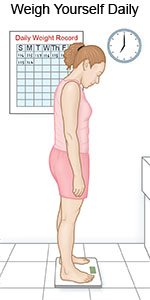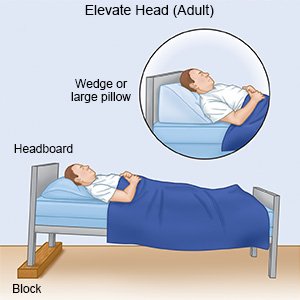Pulmonary Edema
Medically reviewed by Drugs.com. Last updated on Apr 6, 2025.
Pulmonary edema is a buildup of fluid in the alveoli (air sacs) of your lungs. The fluid may make it hard for you to breathe. Pulmonary edema may be life-threatening if your body is not able to get the oxygen it needs.
 |
DISCHARGE INSTRUCTIONS:
Call your local emergency number (911 in the US) if:
- You are breathing very fast, sweating, and feel confused.
- You have chest pain or trouble breathing that gets worse.
Seek immediate care if:
- Your heart feels like it skips a beat or flutters.
- You urinate very little or not at all.
- Your lips and nail beds are pale or blue.
Drugs used to treat this and similar conditions
Lasix
Lasix is a loop diuretic used to treat fluid retention from heart, liver, or kidney conditions, and ...
Ozempic
Learn about Ozempic (semaglutide) for type 2 diabetes treatment, weight management, cardiovascular ...
Edecrin
Edecrin is used for ascites, edema, nonobstructive oliguria, pulmonary edema, renal failure
Sodium Edecrin
Sodium Edecrin is used for ascites, edema, nonobstructive oliguria, pulmonary edema, renal failure
Ethacrynic acid
Ethacrynic acid systemic is used for ascites, edema, nonobstructive oliguria, pulmonary edema ...
Bumetanide
Bumetanide systemic is used for ascites, autism, edema, pulmonary edema
Furosemide
Furosemide is a loop diuretic used to treat fluid retention and high blood pressure by increasing ...
Treatment options
The following list of medications are related to or used in the treatment of this condition.
Call your doctor or pulmonologist if:
- You have a fever.
- You gain weight for no known reason.
- You urinate more than usual.
- You have new or increased swelling in your legs or feet.
- You hear new or increased wheezing when you breathe.
- You have questions or concerns about your condition or care.
Medicines:
You may need any of the following:
- Diuretics are given to remove excess fluid from around your lungs and decrease your blood pressure. You may urinate more often when you take this medicine.
- Heart medicines may be given to make your heartbeat stronger or more regular, or to lower your blood pressure.
- Vasodilators may improve blood flow by making the blood vessels in your heart and lungs wider. This may decrease the pressure in your blood vessels and improve your symptoms.
- Take your medicine as directed. Contact your healthcare provider if you think your medicine is not helping or if you have side effects. Tell your provider if you are allergic to any medicine. Keep a list of the medicines, vitamins, and herbs you take. Include the amounts, and when and why you take them. Bring the list or the pill bottles to follow-up visits. Carry your medicine list with you in case of an emergency.
Manage or prevent pulmonary edema:
- Limit liquids as directed. Follow your healthcare provider's directions about how much liquid you should drink each day. Too much liquid can increase your risk for fluid buildup.
- Weigh yourself daily. Weigh yourself at the same time every morning after you urinate, but before you eat. Weight gain can be a sign of extra fluid in your body.

- Rest as needed. Return to activities slowly, and do more each day. You may have trouble breathing when you are lying down. Use foam wedges or elevate the head of your bed. This may help you breathe easier while you are resting or sleeping. Use a device that will tilt your whole body, or bend your body at the waist. The device should not bend your body at the upper back or neck.

- Eat a variety of healthy foods. Healthy foods include fruits, vegetables, whole-grain breads, low-fat dairy products, beans, lean meats, and fish. Healthy foods may decrease your symptoms and help you have more energy. Ask if you need to eat low-salt or low-fat foods.

- Limit or do not drink alcohol. You will need to limit the alcohol you drink, or avoid alcohol completely. Alcohol can worsen your symptoms and increase your blood pressure. If you have heart failure, alcohol can make it worse.
- Do not smoke cigarettes or use drugs. These can cause blood vessel and brain damage. Ask your provider for information if you currently use cigarettes or drugs and need help to quit. E-cigarettes or smokeless tobacco still contain nicotine. Talk to your provider before you use these products.
- Climb to high altitudes slowly. Go slowly to allow your body to get used to a higher altitude. Ask your healthcare provider about the symptoms of high altitude pulmonary edema (HAPE). Ask what to do if you have these symptoms.
Follow up with your doctor or pulmonologist in 7 to 10 days, or as directed:
You may need to return for more tests. Write down your questions so you remember to ask them during your visits.
© Copyright Merative 2025 Information is for End User's use only and may not be sold, redistributed or otherwise used for commercial purposes.
The above information is an educational aid only. It is not intended as medical advice for individual conditions or treatments. Talk to your doctor, nurse or pharmacist before following any medical regimen to see if it is safe and effective for you.
Learn more about Pulmonary Edema
Treatment options
Care guides
Further information
Always consult your healthcare provider to ensure the information displayed on this page applies to your personal circumstances.
